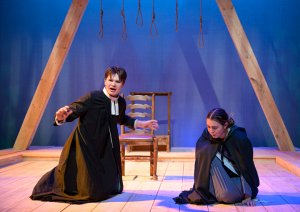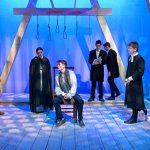‘Weighted with authority’ – The Crucible, a review
 Review by Head of Extended Project and Teacher of English, Stuart Young.
Review by Head of Extended Project and Teacher of English, Stuart Young.
Director, Claudine Sinnett (Director of Drama).
Staging Arthur Miller’s The Crucible presents any cast and director with a problem: The exposition-heavy first and second Acts need a commitment from an audience. The recent production of Miller’s masterpiece at Eastbourne College managed to navigate this by setting an unsettling tone from the outset. Thoughtful use of music, stage effects and set design helped the cause. The influence of Margaret Atwood’s The Handmaid’s Tale is clear in this adaptation and the sparse nature of the set, coupled with some truly emotionally pitched performances, struck a powerful chord.
Tituba’s creole chanting acted as a sinister prologue before the arrival of Salem’s girls (or ‘witches’) thoughtfully reimagined here as red-cloaked, white-bonneted ‘Handmaids’. This was a thoughtful nod to their lowly status, but empowered (or rather manipulated) by Imo Carr’s Abigail Williams – an angsty mixture of adolescent envy and newly-realised power – the ‘coven’ of girls set the premise for the drama. What had they really been up to in the woods?
There was no difficulty in believing that Abigail had these girls under her spell. Charlie Pincus as her uncle, the Reverend Samuel Parris was well judged. His neurotic paranoia and fear of losing his flock was clear from the first to the last beat – as indeed was his hapless ignorance of what his niece was really up to. Abigail’s determination to have John for her own leads to an unstoppable cull of any who oppose her. Before long the devil is indeed loose in Salem, dealing in death. The court scene in Act 3, in which Abigail essentially bullies Mary Warren in submission, was truly terrifying. A spine-chilling, hair-tingling moment which reminds us of the chilling power that the many can wield when aligned against the individual.
Jerome Convert’s earnest and likeable Reverend Hale provided the audience with a link to the dilemma as the action played out. His tortured questioning of witchcraft or pretence convinced us to go with him on the journey. However, it was Hugo Verelst-Way as John Proctor and Uma Carey-Morgan as Elizabeth Proctor who really held the emotional substance of the play together. In the wake of John’s infidelity with Abigail, the tragedy of the Proctors is that they rediscover their devotion to each other – and their ideals – too late. The moment of their love’s reawakening is simultaneously the point at which they will be parted forever. In a moving and emotional final act the atmosphere was electric. The ability to communicate such emotion in a truly believable relationship culminated in a powerful conclusion.
Special mention must be given to Toby Anderson as Danforth; Audrey Hammer as Mary Warren and Lily Flint as Rebecca Nurse. I have never seen an angrier Giles Corey than Raffie McKenzie-Donovan but it really worked here! All delivered convincing portrayals in critical supporting roles. In a play as complex as this one, every member of the cast has to bring their A-game. Miller’s allegory for the McCarthy ‘witch trials’ has lost none of its potency and this production reminds us of the need to remain honest and true to one’s ideals, even when those around attempt to besmirch something as simple as a name. This is an invaluable lesson in an era when so often opinion prevails over fact. As a result, this play leaves lasting echoes. To borrow a few lines from Miller himself:
“More weight?”
Not in this production, for it is “weighted with authority”.
by Stuart Young
For the College’s spring 2020 arts programme, click/tap here.
Gallery
The gallery below contains some images from The Crucible. Click/tap on the thumbnails below to view in high resolution:
- .


























































